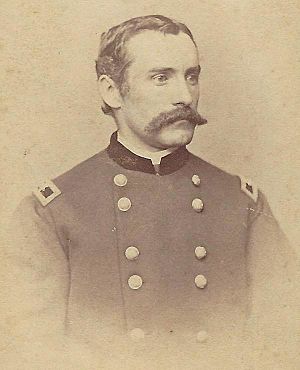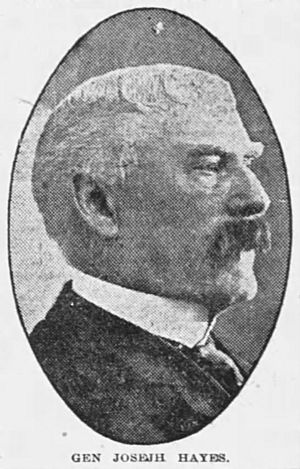Joseph Hayes (general) facts for kids
Quick facts for kids
Joseph Hayes
|
|
|---|---|

Photographic portrait (c. 1864–65)
|
|
| Born | September 14, 1835 South Berwick, Maine |
| Died | August 19, 1912 (aged 76) New York City, New York |
| Allegiance | |
| Branch | Union Army |
| Rank | |
| Wars | |
Joseph Hayes (born September 14, 1835 – died August 19, 1912) was an important person during the American Civil War. He was a smart engineer and a high-ranking officer, a brigadier general, in the Union Army. He led thousands of soldiers in battles.
Contents
Early Life and Education
Joseph Hayes was born in South Berwick, Maine, on September 14, 1835. His father, William Allen Hayes, was a respected judge. Joseph's family had a long history of serving in wars, including the Colonial and Revolutionary Wars.
He went to Phillips Exeter Academy to prepare for college. After that, he studied at Harvard University and graduated in 1855. He also took courses to become a civil engineer. Later, he worked on surveys for the Chicago & Rock Island Railway in the West.
Military Service
The Utah War
In 1858, there was a conflict known as the Utah War in Utah. Joseph Hayes became the captain of an artillery company (a group of soldiers with cannons) in Iowa. He was officially given this role by Governor Samuel J. Kirkwood.
Serving in the Civil War
When the American Civil War began, Joseph Hayes quickly offered to serve. On July 26, 1861, he was made a major in the 18th Massachusetts Infantry Regiment.
Praised for Bravery at Fredericksburg
Major Hayes and his regiment fought in the Peninsula campaign. He became a lieutenant colonel on August 25, 1862. He led his regiment bravely in the very tough Battle of Fredericksburg. His actions were highly praised.
His regiment charged three times at St. Mary's Heights. More than half of his soldiers were killed or badly hurt. One officer remembered Hayes being very upset by the terrible losses.
Hayes became a colonel on November 29, 1862. He led his regiment in the Battle of Chancellorsville. He also commanded the soldiers who protected the army's retreat.
He fought in several smaller battles. At the Battle of Gettysburg, his regiment joined with the 22nd Massachusetts Infantry Regiment. They faced Pickett's famous attack by the Confederate forces.
In September 1863, Hayes took command of a larger group of soldiers, the 1st Brigade of the 5th Corps. He held this command until 1864.
Hayes then returned to lead his regiment in the Battle of the Wilderness. He led the front line of an attack that broke through the enemy's defenses. They captured many prisoners. During this battle, he was seriously wounded in the head and had to go to a hospital.
Captured by the Enemy
On May 12, 1864, Hayes was promoted to brigadier general. After he recovered from his wound, he was given command of a brigade in the 5th Corps. He led this group during the Siege of Petersburg. His soldiers successfully captured the Weldon Railroad on August 21, 1864.
The Confederates tried hard to get the railroad back, attacking with many brigades. But General Hayes and his troops fought them off. Hayes's unit suffered heavy losses. Both of his close assistants were shot right next to him.
The next day, while exploring in a thick forest, General Hayes was captured by Confederate soldiers. He was held prisoner for several months at Libby Prison in Richmond, Virginia. While he was a prisoner, the U.S. government appointed him to distribute food and clothing to other Union prisoners in the South.
After he was released, he returned to the army. He was given command of two combined brigades. He then led the advance of the 5th Army Corps as they chased Lee's Army. The white flag of surrender first came to him at Appomattox Courthouse.
Hayes left the army on August 24, 1865. He was given the honorary rank of major general of volunteers on March 13, 1865.
Life After the War
After the Civil War, Joseph Hayes became well-known as a mining engineer. In 1877, he brought a new way of mining called hydraulic mining to Colombia.
General Hayes passed away on August 20, 1912, at the age of 77. He died in a private sanitarium in New York City. He never married.


